英语口语技能考核方案——李慧
英语口语水平测试活动方案

英语口语水平测试活动方案活动方案:英语口语水平测试一、活动目的:通过英语口语水平测试活动,旨在提高参与者的英语口语表达能力,增加词汇量,培养流利的口语表达能力,增强英语交流能力,加深对英语学习的兴趣。
二、活动时间与地点:时间:每周一下午2点至4点地点:英语教室三、活动流程:1.分组:参与者根据自身的英语水平分为初级组、中级组和高级组。
每组人数最多为8人。
2.抽签确定测试顺序:每个小组从参与者中抽取一位作为第一轮测试的参与者。
3.第一轮测试(个人表达):a.主持人根据抽签顺序,依次给参与者一个主题进行个人表达。
b.主题可以是日常生活、爱好、旅行等与参与者生活经验相关的主题。
c.参与者需要在约1分钟内表达自己对主题的观点、理由以及做法。
4.评委评分:每个参与者完成个人表达后,评委将按照内容(50%)、语言运用(30%)和流利程度(20%)给出得分。
5.第二轮测试(小组讨论):a.每个小组将参与者按照抽签顺序分为两组。
b.每个小组会依次给两组参与者提供一个辩论主题,例如“是否应该实行强制义务教育”等。
c.每组有3分钟时间准备辩论观点,然后进行3分钟辩论。
d.辩论后,评委根据参与者的角色扮演能力、语言运用以及辩论观点的合理性给出得分。
6.最终测试及颁奖:a.按照个人表达和小组讨论的得分总和进行排名。
b.排名靠前的参与者将进入决赛,进行最终的个人演讲表达。
c.最后通过评委的打分,选出优胜者,并颁发证书和奖品。
四、活动准备:1.主持人:负责整个活动的组织和流程导向,引导讨论话题,掌握时间。
2.评委:根据参与者的个人表达和小组讨论对参与者进行评分。
3.活动场地:提供适当的英语学习环境,包括投影仪、音响设备等。
4.测试题目:主题可以是日常生活、时事、环保、爱好等,旨在考察参与者的思维能力和语言表达能力。
5.奖品和证书:为优胜者准备适当的奖品和英语水平测试证书。
五、活动效果评估:通过参与者的参与度和活动返馈评价,以及活动后的口语水平提升来评估活动的效果。
高三英语口语考试实施方案
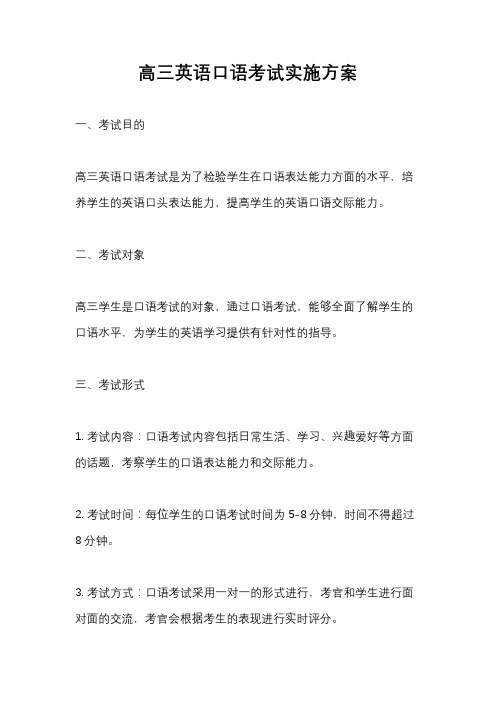
高三英语口语考试实施方案一、考试目的高三英语口语考试是为了检验学生在口语表达能力方面的水平,培养学生的英语口头表达能力,提高学生的英语口语交际能力。
二、考试对象高三学生是口语考试的对象,通过口语考试,能够全面了解学生的口语水平,为学生的英语学习提供有针对性的指导。
三、考试形式1. 考试内容:口语考试内容包括日常生活、学习、兴趣爱好等方面的话题,考察学生的口语表达能力和交际能力。
2. 考试时间:每位学生的口语考试时间为5-8分钟,时间不得超过8分钟。
3. 考试方式:口语考试采用一对一的形式进行,考官和学生进行面对面的交流,考官会根据考生的表现进行实时评分。
四、考试评分标准1. 流利度:考察学生的口语表达是否流利,是否能够自如地进行口语交流。
2. 词汇和语法:考察学生的词汇量和语法运用能力,是否能够准确地运用词汇和语法进行表达。
3. 发音和语调:考察学生的发音准确性和语调是否自然,是否符合英语的语音规律。
4. 交际能力:考察学生是否能够进行有效的交际,是否能够在对话中表达自己的意见和看法。
五、考试准备1. 考试材料:学校需要为学生准备口语考试的相关材料,包括话题、对话练习等。
2. 口语训练:学校需要安排老师进行口语训练,帮助学生提高口语表达能力和交际能力。
3. 考试环境:学校需要提供良好的考试环境,保证考生在舒适的环境下进行口语考试。
六、考试实施1. 考试安排:学校需要提前安排口语考试的时间和地点,确保考试的顺利进行。
2. 考试监督:学校需要安排专门的监考人员对口语考试进行监督,保证考试的公平公正。
3. 考试记录:学校需要对口语考试进行记录,及时对学生的口语表现进行评分和反馈。
七、考试效果口语考试的结果将作为学生英语综合素质评价的重要依据,学校将根据口语考试的结果对学生进行奖惩和指导。
八、考试总结口语考试是学生英语学习的重要组成部分,通过口语考试能够全面了解学生的口语水平,对学生的英语学习起到积极的促进作用。
高一就业班英语技能考核方案及朗读材料
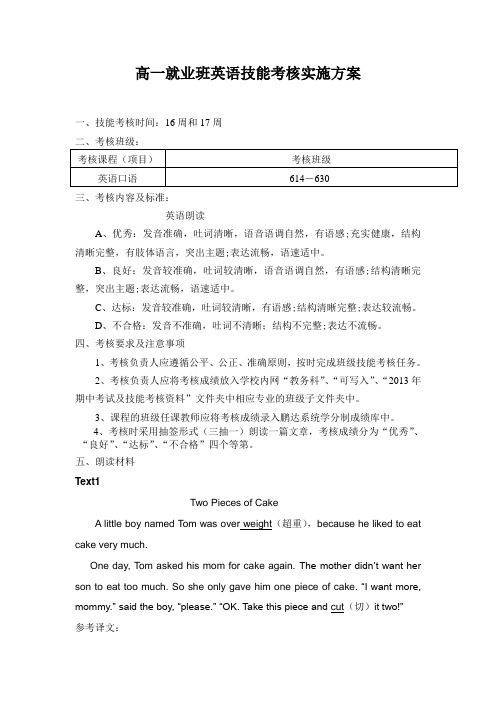
高一就业班英语技能考核实施方案一、技能考核时间:16周和17周二、考核班级:三、考核内容及标准:英语朗读A、优秀:发音准确,吐词清晰,语音语调自然,有语感;充实健康,结构清晰完整,有肢体语言,突出主题;表达流畅,语速适中。
B、良好:发音较准确,吐词较清晰,语音语调自然,有语感;结构清晰完整,突出主题;表达流畅,语速适中。
C、达标:发音较准确,吐词较清晰,有语感;结构清晰完整;表达较流畅。
D、不合格:发音不准确,吐词不清晰;结构不完整;表达不流畅。
四、考核要求及注意事项1、考核负责人应遵循公平、公正、准确原则,按时完成班级技能考核任务。
2、考核负责人应将考核成绩放入学校内网“教务科”、“可写入”、“2013年期中考试及技能考核资料”文件夹中相应专业的班级子文件夹中。
3、课程的班级任课教师应将考核成绩录入鹏达系统学分制成绩库中。
4、考核时采用抽签形式(三抽一)朗读一篇文章,考核成绩分为“优秀”、“良好”、“达标”、“不合格”四个等第。
五、朗读材料Text1Two Pieces of CakeA little boy named Tom was over weight(超重),because he liked to eat cake very much.One day, Tom asked his mom for cake again. The mother didn’t want her son to eat too much. So she only gave him one piece of cake. “I want more, mommy.” said the boy, “please.”“OK. Take this piece and cut(切)it two!”参考译文:一个名叫汤姆的小男孩超重,因为他非常喜欢吃蛋糕。
一天,汤姆又问妈妈要蛋糕吃。
妈妈不想让儿子吃得太多,所以只给了他一块。
口语认证考核方案

口语认证考核方案背景简介随着全球化的不断深入,英语成为了通往世界的有效手段。
许多机构、企业和学校都要求员工或学生具备流利的英语口语能力,而相关的考试和认证也随之而来。
本文将介绍一种有效的口语认证考核方案。
方案描述考核内容该方案主要考察英语口语表达能力,包括但不限于以下内容:•发音:准确地发音,正确地运用语音规则•语法:正确地运用英语语法•词汇:灵活地使用词汇•流畅度:流利地表达思想,不出现太多停顿或断句•表达准确度:准确地表达思想,不出现语病或歧义考核方式该方案采用面试的方式进行考核。
考试时间为10-15分钟,考核官会与考生进行对话,以考察其英语口语能力。
考核官会根据考生的表现,结合下文所述的评分标准,给出综合得分。
评分标准考核官将根据以下标准对考生进行评分,分数范围为1-10分。
•发音:5分–1分:发音错误非常明显,并且难以听懂–3分:发音错误有些明显,但总体能被理解–5分:发音正确,但略带口音–7分:发音正确,且没有口音–10分:发音非常标准,没有任何口音•语法:5分–1分:语法错误非常明显,经常出现–3分:语法错误有些明显,但总体还算准确–5分:语法基本正确,但偶尔出现错误–7分:语法准确无误,除了少量细节错误–10分:语法非常准确,没有任何错误•词汇:2分–1分:使用的词汇非常有限,难以表达意思–2分:使用的词汇比较丰富,但非常基础常用–4分:使用的词汇较为丰富,能够表达思想–6分:使用的词汇比较高级,能够较为精准地表达思想–8分:使用的词汇非常高级,能够表达复杂的思想–10分:使用的词汇极其高级,令人赞叹•流畅度:2分–1分:经常出现停顿或断句,让人感到不自然–2分:偶尔出现停顿或断句,但总体还算流畅–4分:表达流畅,但存在少许断续或停顿–6分:表达非常流畅,没有断句或明显停顿–8分:表达非常流畅,不仅没有停顿,而且还能够自如地切换话题–10分:表达非常流畅,不仅没有停顿,而且能够运用丰富的词汇和语法表达复杂思想•表达准确度:6分–1分:表达非常含混不清,让人难以理解–2分:表达部分含混不清,但总体还算准确–4分:表达基本准确,但存在一些语病或歧义–6分:表达精准无误,符合英语表达习惯–8分:表达非常精准,富有表现力,能够反映个人思想和情感–10分:表达非常精准,无论在语言细节还是表现力上都非常卓越考核结果考核官将在考试结束后,综合评价考生的表现,给出综合得分。
李慧校级公开课学案(7上,U3,P1) 太平哨中学七年级上册英语导学案
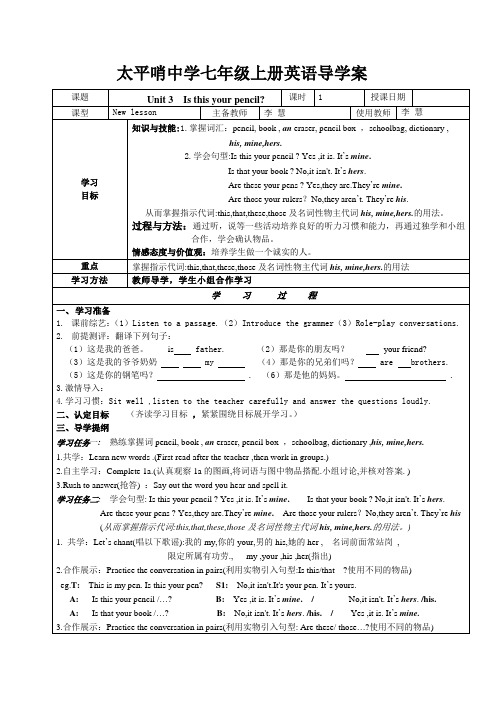
(5)这是你的钢笔吗?.(6)那是他的妈妈。.
3.激情导入:
4.学习习惯:Sitwell ,listento the teacher carefully and answer the questions loudly.
二、认定目标(齐读学习目标,紧紧围绕目标展开学习。)
2.自主学习:Complete 1a.(认真观察1a的图画,将词语与图中物品搭配.小组讨论,并核对答案.)
3.Rush to answer(抢答):Say out the word you hear and spell it.
学习任务二:学会句型: Is thisyourpencil ?Yes,itis.It’smine.Isthat yourbook ?No,itisn't.It’shers.
三、导学提纲
学习任务一:熟练掌握词pencil,book,aneraser,pencilbox,schoolbag,dictionary,his,mine,hers.
1.共学:Learn newwords .(First read after the teacher ,then work in groups.)
2.学会句型:Is thisyourpencil ?Yes,itis.It’smine.
Isthat yourbook ?No,itisn't.It’shers.
Are these yourpens ?Yes,theyare.They’remine.
Are those your rulers?No,theyaren’t. They’rehis.
从而掌握指示代词:this,that,these,those及名词性物主代词his,mine,hers.的用法。
口语认证考核方案

口语认证考核方案背景口语是英语学习的重要组成部分。
许多人在学习英语时花费了大量时间和精力,但却面临着口语能力不足的问题。
因此,为提高学员的英语口语能力,学校设计了针对学员的口语认证考核方案。
设计目标该考核方案的目标是检验学员的英语口语能力,同时指导学员发现并纠正自己的语音、语法和用词错误。
方案内容该认证考核方案将分为三个部分:初级、中级和高级考核。
初级考核初级考核主要是检验学员的基本口语能力。
考核时间为10分钟,要求学员朗读指定文章,回答问题和展示简单的对话技巧。
中级考核中级考核是对初级口语能力的加强考核。
考核时间为15分钟,要求学员自行选择文章,并准备一份简短的演讲,同时在演讲结束后展示自己的对话技巧。
高级考核高级考核是对学员英语口语能力的综合考察。
考核时间为20分钟,要求学员完整地阅读一篇论文并对其进行评论,同时也必须对自己的观点做出充分解释。
除此之外,学员必须准备一份PPT,并在演示时使用一些高级的英语语法和词汇。
考核标准考核将按照以下标准进行评分:•流利度:学员应该有自信地使用英语进行表达。
•语音:发音准确性和自然度。
•用词:学员语法和用词虽然不必全面正确,但要避免明显的错误。
•交流能力:学员需要展示一定的对话和交流技巧,能够及时准确地回答问题并提出自己的观点。
考核结果学员将会收到一份证书,证明他们已经通过该级别的考核。
如果没有通过考核,学员可以继续参加下次的考核,同时他们会收到一份反馈报告,指出他们在哪些方面需要改进。
结论通过该认证考核方案,学员能够更好地了解自己的英语口语能力,并有针对性地练习和改进自己的口语表达能力。
同时,该方案也为学员提供了一种正式的评估体系,以便他们更好地评估自己的能力和提高自己的英语水平。
2013版小学英语”三说“比赛李慧

研读课标,细读教材-------小学英语六年级上册教材解读云鹰小学: 李慧尊敬的各位领导、老师们:大家好!今天我研读的是PEP新版小学英语六年级上册,我的标题是《钻研课标,细读教材》,今天的解说主要分为“说课标、说内容、说建议”三个步骤。
一、说课标只有把握好目标,才能找准教学的方向。
我将从英语课程的总体目标开始,到本学段的目标再这本教材的课程目标逐步阐述。
(1)本学科的课程总目标义务教育阶段英语课程的总体目标是:通过英语学习使学生形成初步的综合语言运用能力,促进心智发展,提高综合人文素养。
综合语言运用能力的形成建立在语言技能、语言知识、情感态度、学习策略和文化意识等方面整体发展的基础之上。
语言技能和语言知识是综合语言运用能力的基础;文化意识有利于正确地理解语言和得体地使用语言;有效的学习策略有利于提高学习效率和发展自主学习能力;积极的情感态度有利于促进主动学习和持续发展。
这五个方面相辅相成,共同促进学生综合语言运用能力的形成与发展。
(2)学段目标语言课程设置共有九级。
小学毕业至少要达到二级目标水平。
为什么也要用“至少”二字呢?因为一个现象引起了我的思考。
北京,上海那些一线城市的孩子英语水平要比我们农村的孩子好的多。
六年级要求学生达到课程标准的二级目标:对继续学习英语有兴趣。
能用简单的英语互致问候,交换有关个人、家庭和朋友的简单信息,并能就日常生活话题作简短叙述。
能在图片的帮助下听懂、读懂并讲述简单的故事,能在教师的帮助下表演小故事或小短剧,演唱简单的英语歌曲和歌谣。
能根据图片、词语或例句的提示,写出简短的描述。
在学习中乐于参与、积极合作、主动请教,初步形成对英语的感知能力和良好的学习习惯。
乐于了解外国文化和习俗。
(3)本册目标能听、说、读、写55个单词,9个短语和33个单句能听懂、会唱6首英文歌曲。
能听、说、认读83个单词和短语,学会六个简单的谚语理解和表达有关问路、出行方式、活动安排、爱好、职业以及情绪等几个话题的信息。
《口语》课程考核方案

《英语口语》课程考核方案课程名称英语口语系部国际贸易系考核形式实操课程类型C类使用班级14旅英授课教师方案内容:《英语口语》课程的考核方式由过程性考核和期末口语测试两部分组成,其过程考核成绩占总成绩的70%,期末考核成绩占总评成绩的30%。
学生总评成绩计算公式如下:期末成绩=过程考核*70%+期末测试*30%具体考核方案如下:一、过程考核:1、课堂主题讨论(30%):教师针对每节课的学习内容和学习目标提出讨论主题,让学生对该主题进行讨论,陈述自己的观点。
2、课堂口语任务练习(30%):教师对每节课的口语练习提问,考查学生口语能力。
3、课堂任务演示(40%):教师根据授课内容展开任务演练,如role-play.二、期末实操1、Question and answer (50%):针对本课程学习所需要掌握的内容提出问题。
2、Role-play(50%):学生分组完成指定角色扮演。
评分标准:语音语调(25%)、语法词汇(25%)、流利程度(20%)、交际能力(30%)。
具体标准如下:1.语言连贯、语速适当,发音基本无错误。
语言组织基本合理,无明显语法错误。
60--752.语言连贯、口齿清晰,语音准确,语调自然,无语法错误,有英式或美式发音模仿。
75-853.演讲连贯,流利,语速适当,语音语调准确无语法错误,措辞得当。
语段结构合理,逻辑性强,有个人见解。
85-904.发音不准确。
语言组织不合理,有明显语法错误,缺乏交际能力。
60以下教研室意见:教研主任签字:系部意见:系(部)主任签字:。
2024年初中学业水平考试英语听力口语考试工作方案

2024年初中学业水平考试英语听力口语考试工作方案全文共6篇示例,供读者参考篇1Work Plan for the 2024 Middle School English Listening and Speaking ExamHi everyone! Lily here. I'm just a 5th grader but I've been studying really hard for the big English exam I have to take next year when I enter middle school. The listening and speaking sections seem like they'll be pretty tough, so I've come up with a plan to get myself ready. I'm sharing it here in case any of my friends want to follow along too!First off, I need to get lots of practice listening to English. The exam will have dialogues, narratives, and instructions that we have to understand. My teachers say the best way to build listening skills is through exposure and repetition. So I'm going to try to listen to English audio and watch English videos as much as I can.I've asked my parents to find me some children's audio篇22024 Middle School English Listening and Speaking Exam Work PlanHey guys! I'm super excited to share my work plan for the big 2024 middle school English listening and speaking exam coming up. I know a lot of us elementary kids are already starting to prepare for it. This exam is a really important step towards getting into a great middle school program.My plan has three main parts - practicing listening skills, practicing speaking skills, and some general test tips. I'll go through each part so you can see how I'm getting ready. Maybe some of my ideas will help you too!Listening PracticeListening is half of the exam, so we've got to work hard on understanding all kinds of English. Here are the listening activities I'm doing:Watching English TV shows and moviesMy favorites are animated Disney and Pixar movies. The voices are really clear and there are lots of common conversations. I try to watch one movie per week with English subtitles on. That way I can read along and learn new words too.Listening to English songsMusic is my passion! I make playlists of pop songs with easy lyrics. Singing along helps me practice listening for sounds, rhythms and vocab. My parents even got me premium subscriptions to English music streaming sites.Following along with audiobooksMy school has a great library of graded reader audiobooks. I check them out and follow along in the printed book. The narration is slower than movies which is nice for beginners like us.Doing listening exercise booksThese textbook-style books have multiple-choice questions about dialogs, stories, and conversations. The questions get me focused on key details. My teacher assigns chapters weekly.Speaking PracticeThe other half of the exam tests our English speaking ability through questions, prompts, and roleplays. This part makes me nervous, but I'm working hard:Conversing with English tutorsMy parents hired an online English tutor I video chat with twice a week. We just have casual conversations about my life, interests, etc. She gives me tips to improve.Recording myself responding to promptsThere are lots of YouTube prompts like "Describe your favorite holiday" or "Tell a story about..." I record my responses and listen back to catch mistakes.Joining an English drama clubAt my school's club, we read short plays out loud and act out roleplays. It's fun to practice different voices and situations with friends.English speech contestsMy city has public speaking competitions where we give short speeches and get scored by judges. The pressure helps me get used to presenting formally.Test Tips and StrategiesIn addition to practicing skills, I'm also learning some general tips for taking the listening/speaking sections successfully:• Get enough sleep the night before and eat a good breakfast to stay focused• Relax and avoid letting anxiety freeze my mind• Listen/read questions very carefully and understand what is being asked• Take hints from the setup - identify speakers, setting, relationships• For listening, don't panic if I miss some details, just keep concentrating• For speaking, take a second to gather my thoughts before responding• Try to notice my own mistakes and correct myself if possible• Speak slowly, clearly and loud enough for the examiner• Stay calm if I get stuck - ask for clarification politely• Use body language like hand gestures and facial expressionsI'm working really hard on this three-part plan each week. My parents and teachers all say listening, speaking, repetitionand staying relaxed are the keys. If I follow my work plan closely, I'll be ready to show off my best English ability!Even though it's over a year away, that huge middle school exam feels so important. I want to do well to try and get into a top program. Hopefully this listening and speaking prep gives me an advantage. I'll keep practicing every day until test time! Let me know if you have any other great tips to share. Ganbatte (頑張って)friends!篇3The 2024 Middle School Exams Are Coming Up – Here's What to Expect for English Listening and Speaking!Hey there, fellow middle schoolers! Can you believe we're already gearing up for the big 2024 academic exams? It feels like just yesterday we were starting 6th grade. Time sure does fly!One of the exams we'll have to take is the English listening and speaking test. I know, I know – English can be a real headache sometimes. But don't worry, I'm here to break down what this exam is all about and share my work plan for getting prepared. We've got this!First off, what exactly is this English listening and speaking exam testing us on? Basically, it's going to evaluate how well we can understand spoken English and communicate back in English too. So we'll likely have a listening comprehension section where we hear recordings and have to answer questions about what was said. The speaking part could involve things like reading a passage aloud, answering open-ended questions verbally, or maybe even having a short conversation!It might sound intimidating, but just think of all the practice we've had in English class over the years. Remember when we thought learning the alphabet was impossible? And now look at us! We can read, write, and kinda-sorta speak English. This exam is just the next step.My biggest struggle with English has always been listening comprehension. You know that feeling when you think you understood something, but then you totally blank on what was actually said? Or when the person is speaking too fast and you miss every other word? So frustrating! Speaking is hard too since I get all nervous and tongue-tied.That's why I've put together a game plan to work on both my listening and speaking skills before the exam. I'm calling it"Operation: Ear Ninja and Mouth Ninja Training." Hear me out (get it?)...For listening practice, I'm going to watch English TV shows, movies, YouTube videos, etc. as much as possible. At first, I'll keep the subtitles on in English to help me follow along. But eventually, I'll try removing subtitles so I really have to focus on comprehending the audio. I might even re-watch certain scenes or clips over and over until I can understand it all. Repetition is key!I'll also start listening to English music, podcasts, or audiobooks during commutes to school or while doing chores around the house. Any opportunity to expose my ears to more English! My parents have even agreed to try speaking to me in English sometimes so I get accustomed to different accents and speaking styles.As for speaking practice, I plan to chat with myself in the mirror as much as possible. I'll come up with scenarios like answering questions about my day or giving instructions on how to do something. The more I hear myself speaking English out loud, the more comfortable I'll become. I've also downloaded some English learning apps with speech recognition so I can get feedback on my pronunciation and fluency.But the best way to improve will be to actually have real English conversations! I'm going to see if my English teacher can set up opportunities for us to chat one-on-one or in small groups during class time. Or maybe we could even do conversations via video call sometimes. I'll admit it'snerve-wracking, but pushing myself to speak English live is so important.Another huge component is expanding my English vocabulary. You can't express yourself richly without knowing lots of words, right? So in addition to listening and speaking practice, I'll be working on building my vocab too. Things like reviewing vocab lists from our textbooks, using English-learning websites with flashcard games, watching English movies or shows and writing down words I don't know, etc. The more words I understand, the better I can comprehend what I hear AND communicate back more precisely.I probably sound like I'm going overboard, but the truth is... English isn't going anywhere anytime soon. Being able to communicate effectively in English is such an important life skill these days. This exam might seem like a huge deal right now, but it's just training for bigger things to come. Getting exposure to English listening and speaking through middle school, highschool, and beyond will pay off big time. Just look at mom and dad – their English has opened so many doors for them in their careers!So I'm going to take this exam super seriously and follow my "Ear Ninja and Mouth Ninja" plan as best I can leading up to the test date. Of course, I'll still make time for hanging out with friends, playing video games, and definitely sleeping in on the weekends (a ninja's gotta rest up, ya know?). But bit by bit, I'm going to chip away at improving my English abilities.My goal is to walk into that exam feeling confident, calm, and prepared. No more getting flustered when I hear someone speaking English. No more awkward silences when it's my turn to respond. By 2024, I'll be an English listening and speaking master! Who's with me?!Let's go crush this English exam together, middle school fam! If we follow a solid game plan like mine and don't leave our studying until the last minute, we've got nothing to worry about. Our English teachers have prepared us well. Now it's our turn to show what we can do!I'll be sending all my best ear ninja and mouth ninja vibes to everyone in the weeks ahead. We've got this!篇42024 Junior High English Listening and Speaking Exam: My Plan to Ace It!Hey there, fellow students! The 2024 junior high English listening and speaking exam is just around the corner, and I bet many of us are feeling a bit nervous. But fear not, my friends, because I've got a solid plan to help us all conquer this test like total bosses!First things first, let's talk about the importance of this exam. It's a big deal, no doubt about it. Our English listening and speaking skills will be put to the test, and the results could impact our futures in significant ways. But instead of letting the pressure get to us, let's channel that energy into productive preparation.One of the most crucial aspects of acing this exam is regular practice. I'm talking about listening to English audio materials every single day, whether it's podcasts, music, movies, or TV shows. The more we expose our ears to the language, the better we'll become at understanding it. And let's not forget about speaking practice too! We can have conversations with ourfriends, family members, or even ourselves (no judgment here) to get those English words flowing freely.Another key element of my plan is to identify our weaknesses and work on them relentlessly. Maybe you struggle with understanding certain accents or have trouble with specific grammar points. Whatever it is, we need to tackle those weaknesses head-on. Seek out resources that focus on those areas, whether it's online exercises, tutoring sessions, or good old-fashioned practice with a buddy.But let's not forget about the fun factor! Learning a language shouldn't be a dull, dreary experience. I plan on incorporating games, songs, and other engaging activities into my study routine. Who says we can't have a blast while boosting our English skills? Plus, when we're genuinely enjoying the process, we're more likely to stick with it and see better results.Now, I know what some of you might be thinking: "But what if I get stage fright or freeze up during the exam?" Valid concern, my friends, but we've got this! Deep breathing exercises, positive self-talk, and visualizing success can work wonders in calming our nerves. And let's not forget the power of a good night's sleep and a hearty breakfast on exam day – a well-rested and nourished mind is a powerful one!Lastly, let's remember to support and encourage each other throughout this journey. We're all in this together, and a little bit of camaraderie can go a long way. We can form study groups, share resources, and celebrate our successes as a team.So, there you have it, my fellow students – my foolproof plan for acing the 2024 junior high English listening and speaking exam. With dedicated practice, targeted effort, a positive mindset, and a supportive community, we've got this in the bag!Let's show the world what we're made of and emerge victorious from this challenge. Who's with me?篇5A Big Year Ahead: The 2024 English Listening and Speaking ExamsHey everyone! Can you believe we're already talking about the 2024 English exams? It feels like just yesterday we were starting junior high. But now, the big tests are right around the corner. I've been hearing a lot of buzz about the listening and speaking sections, so I wanted to share what I know.First off, let's talk about the listening part. From what my English teacher Mr. Wang has told us, it's going to cover all sortsof different situations - conversations between friends, announcements, news reports, you name it! The passages will be played just once during the test, so we really need to pay close attention.Mr. Wang says the key is getting used to understanding different accents and speech patterns. He's had us practicing with audio clips from movies, TV shows, podcasts, you get the idea. At first, it was pretty hard to catch everything. But the more examples we hear, the easier it gets to tune our ears to different speaking styles.We've also been working on note-taking strategies to help us capture key details while listening. Mr. Wang is a stickler for that - he's always saying "The devil is in the details!" I guess he's got a point though. With the listening questions, it's those tiny facts that can make or break your answer.Another big part of prepping for the listening section is building our vocabulary. There's no way we can understand those passages if we don't know what half the words mean! That's why we've been making flashcards, watching English videos, reading easy books...whatever it takes to absorb new words and phrases.The speaking part of the exam is a whole other beast. Kinda scary if you ask me! We basically have to answer questions and discuss different topics...all in English of course. No referring to notes or anything - it's just us and the microphone.I'll be honest, public speaking makes me super nervous, even if it's just in front of a couple test graders. Mr. Wang could sense the class was feeling that way, so he's had us doing all sorts of practice exercises. Like Mock tests where we take turns being the "student" and the "grader." Or filming ourselves giving short speeches and presentations.It's awkward at first, but Mr. Wang says the more we put ourselves out there, the more comfortable and confident we'll become. He's coined this weird phrase he keeps saying: "Feel the fear and do it anyway!" I think he's really onto something there.Probably the toughest part of the speaking section though is coming up with good content on the spot. We have to use clear examples, explain our reasoning, all that good stuff. It's not just about knowing vocabulary - we need to truly understand the topics we're discussing.That's where Mr. Wang's "endless questioning" method comes in. Basically he'll ask us a question about something we're familiar with, like sports or music. Then he'll keep firingfollow-ups to push our thinking deeper. Like "Why do you like that band?" "What makes their songs unique?" "How does their music relate to broader trends or social issues?" And on and on until our brains are fried!It's exhausting, but also kinda fun? I don't know, there's something satisfying about really digging into a subject and being able to share insightful thoughts on it. Mr. Wang says that's the level of substance we need for the open-ended speaking questions.On top of all the listening and speaking practice, we're also getting tutored on testing skills and strategies. Like how to manage our time, the best ways to outline our responses, specific techniques for different question types, and so on. The goal is to go into the exam feeling ready, not frazzled.It's been a lot of hard work, but I can feel myself improving already. Just having lots of English audio constantly playing in the background has rewired my ears. And I definitely feel way more confident about speaking up, even if I still get butterflies sometimes.The exams are going to be no joke - that's for sure. But Mr. Wang is prepping us hard, and I really think we've got a solidstrategy in place. If we stay focused and put in the practice, I'm confident we can rock this thing!Wow, that ended up being way longer than I planned. But there's just so much to say about how we're getting ready. I guess that's a good sign though - it means we're taking it seriously and giving it our all. This is a big moment in our academic journey, and I know our whole class is determined to make it count.Anyways, that's my overly-detailed rundown of our work plan for the upcoming English tests! I'll do my best to update you all as we get closer. For now, wish me luck...I'm going to need it! Let's show those exams who's boss.篇6A Fun Plan for the 2024 English Listening and Speaking Test!Hey there, friends! Are you getting ready for the big English test next year? Don't worry, I've got a super cool plan to help you ace the listening and speaking parts. Just follow along and you'll be speaking English like a pro in no time!First up, let's talk about listening skills. You'll need to listen really carefully to conversations, stories, and instructions inEnglish. It's kind of like when your teacher reads you a book in class, but in another language. Pretty neat, right?Here's what you can do to get better at listening:Watch movies and TV shows in English! Look for ones with subtitles in your language at first, so you can read along. Then try without subtitles once you get better.Listen to English songs and podcasts for kids. Singing along is great practice!Play games where you have to follow instructions in English. Ask your parents or teachers for suggestions.Read out loud to yourself in English, then listen back to a recording. Hearing yourself can help a lot.Next, let's move on to speaking. This is where you'll get to show off your English skills!For speaking practice, you can:Have conversations in English with your classmates, parents, or teachers. Talk about your day, favorite games, or anything else!Describe pictures or tell simple stories out loud in English. You can make it up or retell a book you've read.Record yourself speaking English, then listen back. Did you pronounce everything clearly? Keep practicing!Join an English speaking club or find a language partner to practice with regularly.Don't be afraid to make mistakes. That's how you learn! The more you practice speaking out loud, the better you'll get.Another really important part of speaking English is using the right tone, expressions, and body language. You'll need to match how you speak to the situation. For example, you might speak differently when:Giving a presentation in classOrdering food at a restaurantAsking your teacher for helpIntroducing yourself to someone newThe best way to get this right is through lots and lots of practice. But don't worry, it will become natural over time.Okay, now for some extra tips to take your English skills to the next level:Learn new vocabulary with flashcards or apps. Go for words related to topics on the test.Listen for context clues to figure out meanings. The speaker's tone and the situation can give hints.Stay motivated by rewarding yourself when you practice! Maybe treat yourself to a sticker or small prize.Don't be nervous on test day. You've prepared and you've got this! Relax and just do your best.Wow, that was a lot of information! But I know you can do it. Just take it step-by-step and make learning English fun. Good luck, superstars! You've got this in the bag.。
口语技艺考核方案
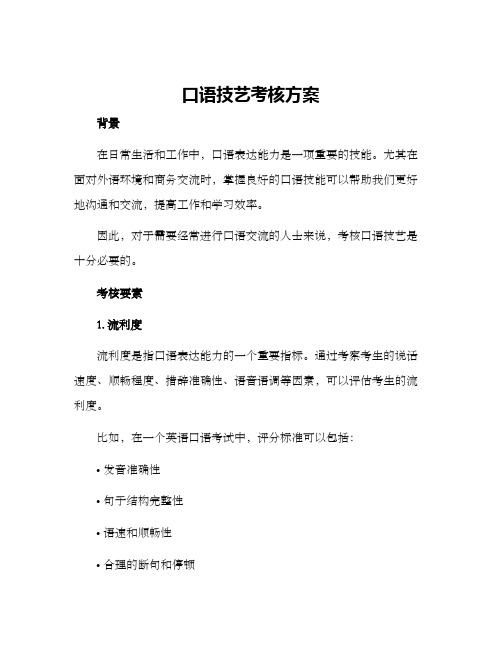
口语技艺考核方案背景在日常生活和工作中,口语表达能力是一项重要的技能。
尤其在面对外语环境和商务交流时,掌握良好的口语技能可以帮助我们更好地沟通和交流,提高工作和学习效率。
因此,对于需要经常进行口语交流的人士来说,考核口语技艺是十分必要的。
考核要素1. 流利度流利度是指口语表达能力的一个重要指标。
通过考察考生的说话速度、顺畅程度、措辞准确性、语音语调等因素,可以评估考生的流利度。
比如,在一个英语口语考试中,评分标准可以包括:•发音准确性•句子结构完整性•语速和顺畅性•合理的断句和停顿•语调变化以及语音语调表达的准确性等2.表达清晰度表达清晰度是指考生表达意思的准确程度。
这包括考生使用的词汇和语法的准确性、表达的清晰度和条理性。
如在英语口语考试中,评分标准可以包括:•语法准确性•词汇选择•上下文判断•逻辑性和前后连接性•选择恰当的语境和语言风格3.口语素养口语素养是指考生的口语交际能力和对社交语境的适应能力。
这包括考生的交际技能、社交礼仪和文化素养。
如在英语口语考试中,评分标准可以包括:•礼仪表现•社交技能•文化素养•谈话主题的恰当性和深度•响应他人的问话和意图•总体表现的自信和聪明考核流程考核口语技艺可以采用多种方式,包括成套考试、独立讲演等形式。
在考试之前,需要明确考核的内容、流程和评分标准等。
评分标准可以通过设置评分表或评分标准,考官可针对考生的表现做出各项评分。
在考试评分后,考试机构会将考生的考试得分综合评定,给出相应的综合评价。
这一综合评价可以应用在职业招聘、出国留学、培训推荐等方面。
结论对于需要经常进行口语交流的人士来说,掌握好的口语技艺是十分必要的。
而考核口语技艺则是评估和提高口语技能的有效方式。
在考核中,我们需要考虑各种不同的考核标准和流程,尽可能的和实际情况贴近,从而最大限度的提高我们自身的口语表达能力。
英语口语考核方案
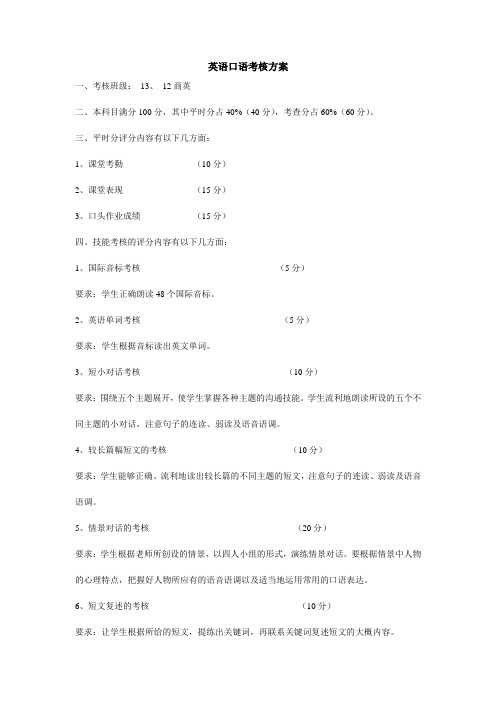
英语口语考核方案
一、考核班级:13、12商英
二、本科目满分100分,其中平时分占40%(40分),考查分占60%(60分)。
三、平时分评分内容有以下几方面:
1、课堂考勤(10分)
2、课堂表现(15分)
3、口头作业成绩(15分)
四、技能考核的评分内容有以下几方面:
1、国际音标考核(5分)
要求:学生正确朗读48个国际音标。
2、英语单词考核(5分)
要求:学生根据音标读出英文单词。
3、短小对话考核(10分)
要求:围绕五个主题展开,使学生掌握各种主题的沟通技能。
学生流利地朗读所设的五个不同主题的小对话,注意句子的连读、弱读及语音语调。
4、较长篇幅短文的考核(10分)
要求:学生能够正确、流利地读出较长篇的不同主题的短文,注意句子的连读、弱读及语音语调。
5、情景对话的考核(20分)
要求:学生根据老师所创设的情景,以四人小组的形式,演练情景对话。
要根据情景中人物的心理特点,把握好人物所应有的语音语调以及适当地运用常用的口语表达。
6、短文复述的考核(10分)
要求:让学生根据所给的短文,提练出关键词,再联系关键词复述短文的大概内容。
《2024年英文口语大赛策划方案》范文
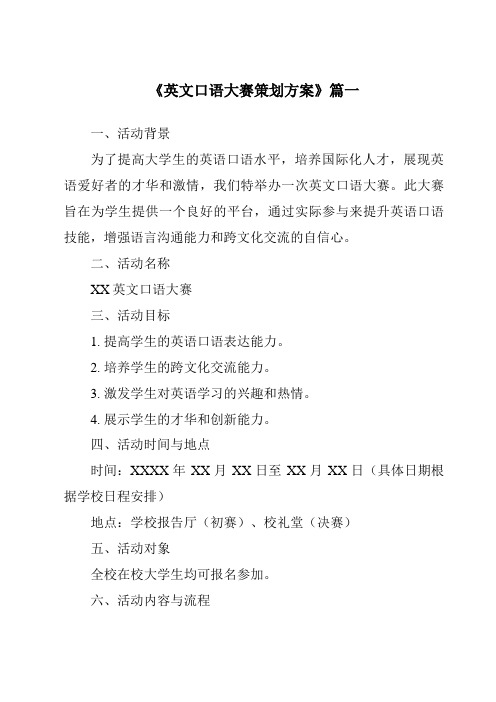
《英文口语大赛策划方案》篇一一、活动背景为了提高大学生的英语口语水平,培养国际化人才,展现英语爱好者的才华和激情,我们特举办一次英文口语大赛。
此大赛旨在为学生提供一个良好的平台,通过实际参与来提升英语口语技能,增强语言沟通能力和跨文化交流的自信心。
二、活动名称XX英文口语大赛三、活动目标1. 提高学生的英语口语表达能力。
2. 培养学生的跨文化交流能力。
3. 激发学生对英语学习的兴趣和热情。
4. 展示学生的才华和创新能力。
四、活动时间与地点时间:XXXX年XX月XX日至XX月XX日(具体日期根据学校日程安排)地点:学校报告厅(初赛)、校礼堂(决赛)五、活动对象全校在校大学生均可报名参加。
六、活动内容与流程1. 初赛阶段(第一轮):线上提交一分钟英文自我介绍视频,内容可包括个人介绍、兴趣爱好、未来规划等。
由专业评委打分,选出前若干名进入下一轮。
2. 主题演讲(第二轮):线下比赛,主题需与现代生活紧密相关。
学生需在指定时间内准备演讲并展示自己的表达能力。
评委将根据内容、语言表达、流利度等方面进行评分。
3. 辩论环节(第三轮):学生需就特定主题进行辩论,展示辩论技巧和快速反应能力。
评委将根据学生的表现和团队协作能力进行评分。
4. 现场问答:由主持人提出一些关于比赛主题的问题,参赛者需在规定时间内给出答案。
此环节旨在测试参赛者的思维敏捷度和应对能力。
5. 公布获奖名单及颁奖典礼:举行一场颁奖典礼,表彰优秀选手和团队,颁发奖项及证书。
七、活动宣传与推广1. 通过校园广播、海报、横幅等方式进行宣传,吸引更多学生参与。
2. 利用学校官方网站、微信公众号等平台发布活动信息,扩大活动影响力。
3. 与学生会、社团等组织合作,共同推广活动,提高参与度。
八、活动预算与赞助商招募1. 根据活动规模和需求,制定详细的预算计划,包括场地租赁、设备购置、奖品设置等费用。
2. 招募赞助商,如英语培训机构、企业等,通过赞助资金或提供奖品来支持活动的举办。
英语综合技能决赛方案
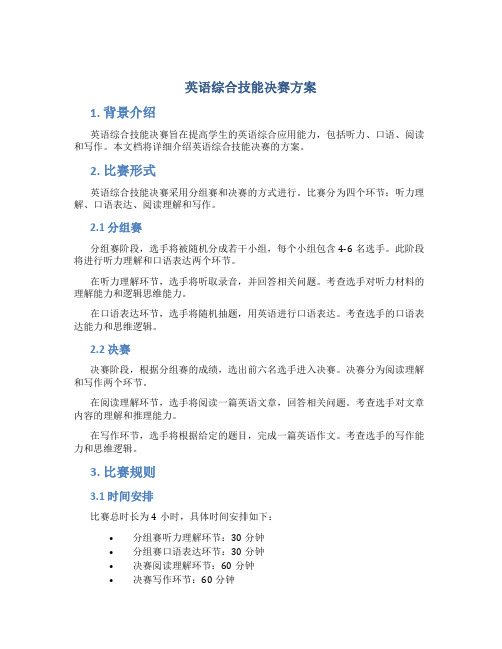
英语综合技能决赛方案1. 背景介绍英语综合技能决赛旨在提高学生的英语综合应用能力,包括听力、口语、阅读和写作。
本文档将详细介绍英语综合技能决赛的方案。
2. 比赛形式英语综合技能决赛采用分组赛和决赛的方式进行。
比赛分为四个环节:听力理解、口语表达、阅读理解和写作。
2.1 分组赛分组赛阶段,选手将被随机分成若干小组,每个小组包含4-6名选手。
此阶段将进行听力理解和口语表达两个环节。
在听力理解环节,选手将听取录音,并回答相关问题。
考查选手对听力材料的理解能力和逻辑思维能力。
在口语表达环节,选手将随机抽题,用英语进行口语表达。
考查选手的口语表达能力和思维逻辑。
2.2 决赛决赛阶段,根据分组赛的成绩,选出前六名选手进入决赛。
决赛分为阅读理解和写作两个环节。
在阅读理解环节,选手将阅读一篇英语文章,回答相关问题。
考查选手对文章内容的理解和推理能力。
在写作环节,选手将根据给定的题目,完成一篇英语作文。
考查选手的写作能力和思维逻辑。
3. 比赛规则3.1 时间安排比赛总时长为4小时,具体时间安排如下:•分组赛听力理解环节:30分钟•分组赛口语表达环节:30分钟•决赛阅读理解环节:60分钟•决赛写作环节:60分钟3.2 评分标准每个环节的评分标准如下:•听力理解:根据回答正确的题目数量给出积分。
•口语表达:根据口语表达的流利度、用词准确性和逻辑性给出积分。
•阅读理解:根据回答正确的问题数量和答案的准确性给出积分。
•写作:根据作文内容的连贯性、语法准确性和表达能力给出积分。
3.3 奖项设置根据比赛成绩,设置以下奖项:•冠军:获得英语综合技能决赛冠军称号和奖金。
•亚军:获得英语综合技能决赛亚军称号和奖金。
•季军:获得英语综合技能决赛季军称号和奖金。
•优胜奖:根据成绩排名,设置适当数量的优胜奖。
4. 参赛要求4.1 资格要求凡是在本学期参加了英语综合技能培训并通过期末考试的同学,均有资格参加英语综合技能决赛。
4.2 报名方式参赛选手需提前提交报名申请,包括个人信息和联系方式。
口头考试方案
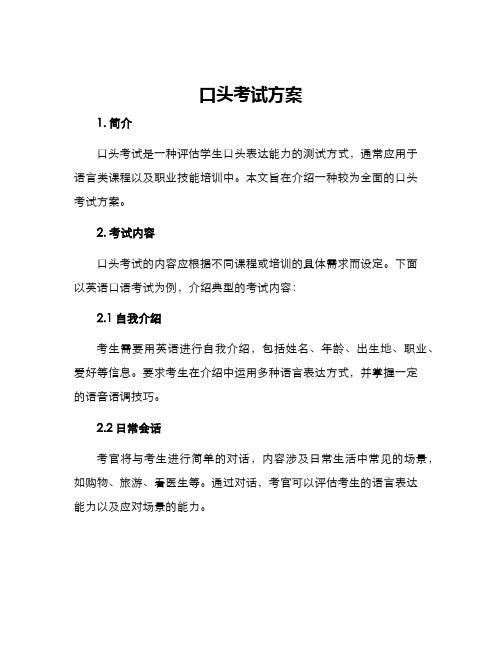
口头考试方案1. 简介口头考试是一种评估学生口头表达能力的测试方式,通常应用于语言类课程以及职业技能培训中。
本文旨在介绍一种较为全面的口头考试方案。
2. 考试内容口头考试的内容应根据不同课程或培训的具体需求而设定。
下面以英语口语考试为例,介绍典型的考试内容:2.1 自我介绍考生需要用英语进行自我介绍,包括姓名、年龄、出生地、职业、爱好等信息。
要求考生在介绍中运用多种语言表达方式,并掌握一定的语音语调技巧。
2.2 日常会话考官将与考生进行简单的对话,内容涉及日常生活中常见的场景,如购物、旅游、看医生等。
通过对话,考官可以评估考生的语言表达能力以及应对场景的能力。
2.3 阅读与朗读考生需要朗读一篇短文,并回答相关问题。
该项考试主要测试考生的阅读理解能力以及朗读技巧。
2.4 听力与口语考官将播放一段英语录音,考生需要听取录音内容并回答相关问题。
该项考试主要测试考生的听力理解能力以及口语表达能力。
2.5 辩论考生将会在一些热门话题上进行辩论,以考核其逻辑思维能力,语言组织能力和谈判能力。
3. 考试流程3.1 考试时间一般英语口语考试时间在15-30分钟之间,也可以根据课程或培训需求进行适当调整。
3.2 考试流程•考试前,考生进行相关准备工作;•考试开始,考官进行自我介绍并简要介绍考试流程;•考生进行自我介绍,并回答考官的相关问题;•考官与考生进行日常会话;•考生朗读短文,并回答相关问题;•考生进行听力与口语测试;•考生参与辩论;•评分与总结,考生得到总分。
4. 考试评分标准口头考试评分主要根据以下标准进行:•发音准确程度;•语法正确性;•词汇掌握程度;•语言表达能力;•应对场景能力;•总体思路清晰度。
5. 考试注意事项5.1 考生准备考生需要提前做好准备工作,包括背诵常用词汇、句型,练习口语表达等。
5.2 气氛创造考试过程中,考官需要积极营造良好的气氛,使考生放松自己,展现更好的表达。
5.3 时间把握考生应根据考场时间适当掌握答题的节奏,不要过慢或过快。
英语口语考核方案

英语口语考核方案1. 背景在全球化背景下,英语已成为一种全球通用语言。
因此,培养学生的英语口语能力对于其综合素质的提升至关重要。
为了更好地评估学生的口语能力,制定一套科学合理的英语口语考核方案是非常必要的。
2. 目标通过英语口语考核方案,我们的目标是评估学生在以下方面的表现:•词汇量和词汇运用能力•句子结构和语法准确性•发音和语调•语言流利度和交际能力•情景应用和语境理解能力3. 考核内容为了全面评估学生的英语口语能力,我们设定了以下考核内容:3.1 词汇和句子考核通过听力和口语练习,考核学生的词汇量和词汇运用能力。
主要包括以下内容:•单词默写:要求学生听力理解并准确书写指定的单词;•词汇填空:要求学生根据句子意思从多个选项中选择合适的单词填入;•句子翻译:要求学生听懂一些简单的句子并能准确翻译成英文。
3.2 发音和语调考核通过对学生的口语表达进行录音评估,主要考核学生的发音和语调。
具体内容包括:•单词发音:要求学生准确发音指定的单词;•句子表达:要求学生根据情景朗读一些模拟对话,并评估其语音语调是否准确。
3.3 交际能力考核通过与学生进行实际对话,考察其交际能力。
具体内容包括:•自我介绍:要求学生能够准确、流利地介绍自己;•日常对话:要求学生能够应对一些日常生活场景并进行简单对话;•辩论演讲:要求学生就一个话题进行辩论演讲,并能够清晰表达自己的观点。
3.4 话题理解和语境应用考核通过主题对话和情景模拟,考核学生在实际语境下是否能够准确理解并应用英语表达。
具体内容包括:•图片描述:要求学生根据一张或多张图片进行描述,并能够准确传达出其中的信息;•情景对话:要求学生模拟一些常见的情景对话,并能够准确应用相关的词汇和句子结构;•真实场景模拟:要求学生在模拟真实场景中进行口语练习,如购物、旅行等。
4. 考核流程为了确保考核的公平性和科学性,我们制定了以下考核流程:1.学生进行词汇和句子考核;2.学生进行发音和语调考核;3.学生进行交际能力考核;4.学生进行话题理解和语境应用考核。
中职英语技能考试方案

中职英语技能考试方案
中职英语技能考试方案可以包括以下内容:
1. 考试内容:考察学生的听、说、读、写能力,并注重应用能力和交际能力的考察。
可以涵盖词汇、语法、阅读理解、听力理解、口语表达和写作等方面。
2. 考试形式:可以设置单项选择题、填空题、阅读理解题、听力理解题、口语对话题和写作题等。
根据考试要求,可以结合听力、口语和写作的综合能力进行综合性考察。
3. 考试时间:根据考试内容和难度,可以设置不同时间段进行考试,如听力理解部分可以设置20分钟,阅读理解部分可以
设置30分钟,口语和写作部分可以分别设置20分钟。
4. 考试评分:可以根据每个部分的题目数量和难度设置相应的得分,将各个部分的得分进行加总得出总分。
同时,可以对口语和写作进行主观评分,考虑语言表达准确性、流利度和语言习惯等方面的评价。
5. 考试准备:为了帮助学生进行考试准备,可以提供相关的教材和复习资料,包括词汇表、语法练习题、听力材料、口语对话题和写作示范等。
可以组织模拟考试和练习,帮助学生熟悉考试形式和提高应试能力。
6. 考试成绩和证书:根据学生的考试成绩,可以给予相应的评价和奖励,如成绩优秀的学生可以获得优秀学生称号或奖学金。
同时,可以颁发英语技能考试的证书,作为学生的英语能力的证明和学业成就的证明。
以上是一个中职英语技能考试的基本方案,可以根据实际情况进行具体的调整和完善。
中学生口语考核方案

中学生口语考核方案一、考核目的和意义:学生口语是衡量语言运用水平和交际能力提高的重要标准。
高考中口语测试已经成为必考环节,因此,中学生口语考核方案的制定对于提高中学生的口语水平、增强中学生的交际能力、促进中学生的综合素质提升具有非常重要的意义。
二、考核内容:1.口语表达:生活、研究、社交等方面的话题;2.听力理解:短文、对话等听力材料;3.口语交际:以情景模拟、角色扮演等方式考核学生的英语口语交际能力。
三、考核方式:考试分为两个环节:口试和笔试。
1.口试:采用小组口语考试方式。
每组考生为三人,以小组形式进行考试,时间为15-20分钟。
考生应根据提供的主题或情景进行交流,口语表达、听力理解和英语交际能力综合考核。
2.笔试:以听力为主,考察学生基本的听力理解能力。
时间为20-30分钟。
四、考核要求:1.口语表达:语音正确、表达清晰流畅、语法正确、用词准确得体、自然。
2.听力理解:听力材料语速不能过快或过慢,每段听力后有一定的答题时间,不懂得问题,可以再听一遍。
3.口语交际:能够流利表达、恰当应答,进行简单的交际,具有一定的英语口语表达能力和语感。
五、考核评分:1.口语表达环节占总分的60%,其中语音、语法、用词、表达流畅各占15%。
2.听力理解环节占总分30%。
3.交际能力环节占总分10%。
六、考核建议:1.加强领导重视,提高学生的英语口语水平;2.注重语音练,提高语感,增强口头表达能力;3.加强研究和交流,培养良好的交流能力;4.加强对口语考试的重视和备考,准确把握考试重点和难点。
本口语考核方案仅供参考,具体的考试内容和方式及评分标准以学校实际管理规定为准。
- 1、下载文档前请自行甄别文档内容的完整性,平台不提供额外的编辑、内容补充、找答案等附加服务。
- 2、"仅部分预览"的文档,不可在线预览部分如存在完整性等问题,可反馈申请退款(可完整预览的文档不适用该条件!)。
- 3、如文档侵犯您的权益,请联系客服反馈,我们会尽快为您处理(人工客服工作时间:9:00-18:30)。
2011年上学期《英语口语》课程技能考核方案
姓名:系(部、院):商贸物流系专业:商务英语班级:高职(5)09-1
一、考核项目及要求
1、考核项目内容
A. 英语语音、语调
B. 商务情景对话
2、仪器设备及场地要求
3、考核时量
每位学生考核时间约为4分钟,全班学生分组进行考试,共需120分钟左右,折合三个课时左右。
问题回答流畅(10分)
.能熟练运用与同学讨论未来计划等相关表达。
2.能用英语进行地道流畅的商务情境对话。
60
英语句型表达基本正确(30分)
口语基本流畅(30分)
合计
100
二、考核评分标准
1、操作和技术基本要求
(1)操作基本要求
(2)技术基本要求
2、评分细则
序号
评分点
技术要求
分值
记分标准
得分
1
语音、语调、口语表达能力
1.语音标准,吐词清晰,
2.朗读节奏适中,语调基本正确。
3.能掌握一定的阅读能力,并能流畅地用英语回答问题。
40
语音基本正确(10分)
语调(10分)
问题回答准确(10分)
